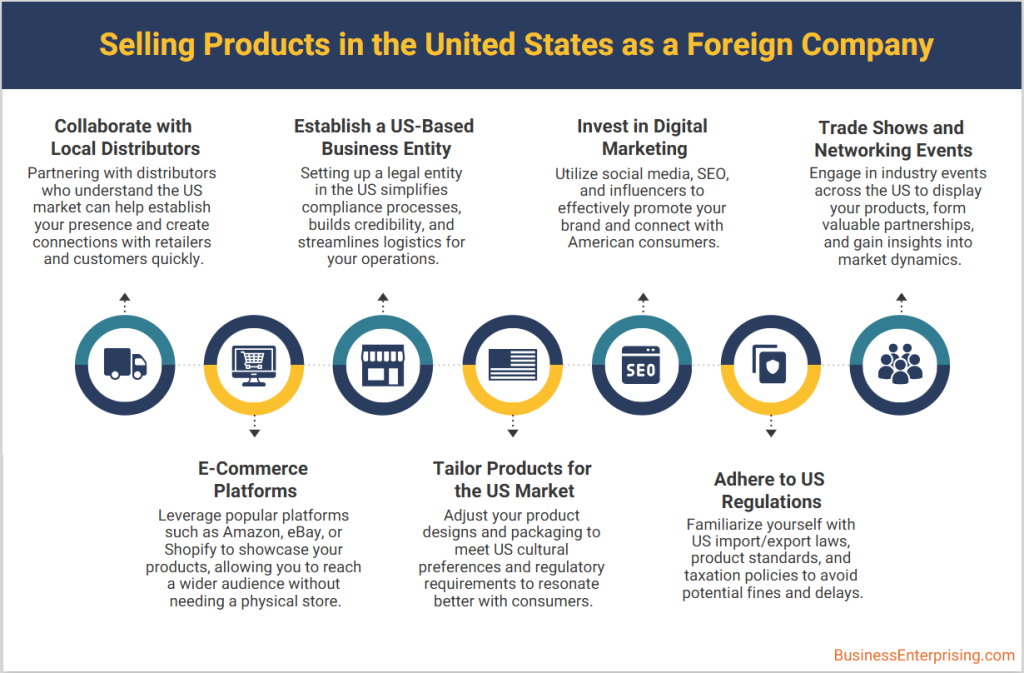 Selling products in the US market presents exciting opportunities for foreign companies. The US offers a large and diverse customer base with significant buying power. However, entering this market requires thoughtful preparation and a clear strategy. Understanding American consumer behavior is essential for tailoring your products and marketing efforts.
Selling products in the US market presents exciting opportunities for foreign companies. The US offers a large and diverse customer base with significant buying power. However, entering this market requires thoughtful preparation and a clear strategy. Understanding American consumer behavior is essential for tailoring your products and marketing efforts.
Additionally, navigating regulations and logistics can be complex but manageable with the right resources. Leveraging e-commerce platforms and digital marketing tools helps you reach customers effectively. These strategies simplify operations while building your brand’s presence across the country.
Success in the US market depends on adapting to local expectations and maintaining flexibility. By addressing challenges and seizing opportunities, you can position your business for growth.
Understanding US Market Dynamics and Consumer Behavior
Understanding US market dynamics and consumer behavior is essential when selling products in the US market. American consumers value convenience and efficiency, often prioritizing products that save time or simplify tasks. Additionally, many consumers appreciate high-quality goods and are willing to pay a premium for brands they trust.
However, preferences can vary across regions, demographics, and income levels. Therefore, researching your target audience is key to tailoring your offerings effectively. For instance, urban consumers may favor eco-friendly or tech-driven products, while suburban or rural shoppers might prioritize affordability and practicality. Understanding these differences helps you refine your marketing strategy.
Americans also value transparency and customer service. They expect clear product descriptions, easy returns, and responsive support. Additionally, online reviews and social proof play a significant role in purchasing decisions. By meeting these expectations, you can build trust and increase customer loyalty. Tailoring your approach to the US market enhances your chances of success and positions your brand for growth.
Navigating Legal and Regulatory Requirements
Navigating legal and regulatory requirements is a critical step in selling products in the US market. Foreign companies must comply with import and export regulations, which often vary based on the type of product. These rules govern how goods enter the country and may require specific permits or certifications.
Additionally, understanding product standards is essential for market entry. Many industries in the US have strict safety, quality, and labeling requirements. For example, the Food and Drug Administration oversees food, cosmetics, and medical devices, while other agencies regulate electronics or toys. Therefore, researching applicable standards ensures your product meets regulatory expectations.
Tax obligations are another key consideration when selling products in the US market. You may need to register for federal and state tax identification numbers to handle sales tax and income tax requirements. Additionally, tariffs or duties might apply depending on the origin and type of your product. Consulting with a legal or tax professional can help you navigate these complexities. By addressing these compliance aspects early, you set a strong foundation for success.
Establishing a Strong Market Entry Strategy
Establishing a strong market entry strategy is essential when selling products in the US market. Partnering with local distributors can help you reach customers quickly. These partnerships provide valuable market insights and simplify logistics. Additionally, distributors often have established networks, allowing your product to gain visibility faster.
Leveraging e-commerce platforms is another effective strategy for entering the US market. Platforms like Amazon, eBay, or Shopify make it easier to showcase your products to a wide audience. These tools also offer integrated solutions for payment processing, shipping, and marketing. Therefore, they allow you to manage sales efficiently without requiring a physical presence.
However, opening a physical presence can benefit businesses with long-term growth plans. A local office or warehouse can improve customer trust and streamline operations. Additionally, physical locations help you build relationships with US-based clients and partners. By choosing the right strategy, you can tailor your approach to fit your business goals and target audience.
Adapting Your Products for the US Market
Adapting your products for the US market is essential for meeting cultural and regulatory expectations. Modifying product designs can make them more appealing to American consumers. For example, colors, materials, or features may need adjustments based on local preferences. Additionally, ensuring your product meets industry-specific standards helps you build trust with customers.
Packaging is another critical area to consider when selling products in the US market. American consumers often expect clear labeling with detailed information, including ingredients, instructions, and safety warnings. Using packaging that aligns with US norms can improve shelf appeal and compliance. Therefore, invest in designs that are visually attractive and informative.
Branding also plays a significant role in connecting with US customers. Cultural differences mean that logos, slogans, or marketing messages may need adjustments to resonate with local values. Additionally, translating your branding effectively into English can make your product more relatable. By tailoring your product, packaging, and branding, you create a better fit for the US market and increase your chances of success.
Leveraging Digital Marketing and E-Commerce Platforms
Leveraging digital marketing and e-commerce platforms is a powerful strategy for selling products in the US market. Platforms like Amazon and Shopify offer access to millions of customers and provide tools to streamline sales. These platforms handle logistics, payments, and even marketing, allowing you to focus on product quality and customer experience.
Social media is another effective channel for reaching US customers. Platforms like Facebook, Instagram, and TikTok allow you to target specific demographics with tailored ads. Additionally, engaging content can build brand awareness and foster trust. By using analytics, you can track campaign performance and refine your strategy for better results.
Combining e-commerce with digital marketing creates a comprehensive approach to entering the US market. For instance, you can drive traffic to your Shopify store through social media campaigns or Amazon ads. Therefore, integrating these tools helps you maximize your reach and connect with US customers more effectively.
Overcoming Common Challenges for Foreign Companies
Overcoming common challenges is essential when selling products in the US market. Logistics is often a significant hurdle for foreign companies. Shipping costs, delivery times, and inventory management can be complex. However, partnering with reliable third-party logistics providers simplifies operations and helps meet customer expectations.
Currency exchange is another challenge that can affect pricing and profitability. Fluctuating rates can create uncertainty in financial planning. Therefore, using payment gateways that handle multiple currencies or locking in exchange rates can reduce risks. Additionally, transparent pricing in US dollars builds trust with American customers.
Cultural differences also impact how your products are received. Americans value clear communication, excellent customer service, and engaging branding. Adapting your messaging to align with these expectations fosters stronger connections. Building trust takes time, but offering quality products, clear return policies, and responsive support helps establish credibility. By addressing these challenges, you create a smoother path for entering and thriving in the US market.
Utilizing Specialized Consultants for Navigating the US Market
Specialized consultants play a significant role in helping foreign companies succeed in selling products in the US market. These experts offer tailored advice to navigate the complexities of entering a new market. From regulatory compliance to logistics, consultants provide guidance that saves time and reduces risk.
Regulatory compliance consultants help you understand and meet US legal requirements. They specialize in import/export laws, product certifications, and safety standards. Additionally, they can assist with labeling and documentation to avoid costly delays. By working with these experts, you can ensure your products meet all necessary regulations.
Market entry consultants focus on developing effective strategies for launching your products. They help identify potential distribution channels, set competitive pricing, and establish partnerships with local businesses. These strategies allow you to enter the market more efficiently while addressing common challenges.
Cultural and marketing consultants guide you in adapting your branding and messaging to American preferences. They provide insights into consumer behavior and help align your customer service practices with US expectations. Additionally, their expertise ensures that your marketing efforts resonate with local audiences.
Logistics and supply chain advisors assist with managing shipping and fulfillment processes. They help optimize inventory systems and recommend cost-effective shipping solutions. By leveraging their expertise, you can streamline operations and improve delivery times. Working with specialized consultants gives you the tools and confidence to succeed in the US market.
Conclusion
Selling products in the US market requires careful planning and adaptability. Understanding the needs of American consumers helps you tailor your offerings effectively. However, navigating regulations, cultural differences, and logistical challenges can be complex. Addressing these issues early ensures smoother entry and long-term success.
Additionally, leveraging e-commerce platforms and digital marketing expands your reach and builds brand visibility. Tools like Amazon and Shopify simplify operations and connect you with customers nationwide. By focusing on trust, quality, and clear communication, you create lasting relationships with American buyers.
Success in the US market is achievable with the right strategies and resources. Regularly assessing your approach helps you stay competitive and aligned with local expectations.



